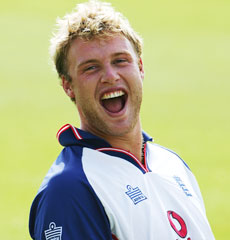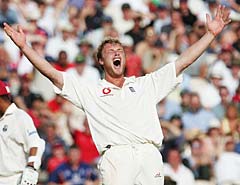Penetrating the cheers and applause as Andy Flintoff saunters to the crease, a shrill note has resounded around English cricket fields this year.
Signalling the arrival of the most dynamic England cricketer for a generation, scores of small boys whistle with unrestrained delight in anticipation of heroic deeds to come.
 "He strides the Test field like Beowulf among his retainers, ready to do battle with giants or monsters," commented former England captain Mike Brearley in his weekly Observer column.
"He strides the Test field like Beowulf among his retainers, ready to do battle with giants or monsters," commented former England captain Mike Brearley in his weekly Observer column.
The reference to the oldest written epic in the English language might escape some spectators. Flintoff's headline-grabbing prowess with bat and ball does not.
During the course of a glorious summer for the national side, Flintoff, derided as an overweight national joke four years ago, has become an international hero.
England have won 10 of their 11 Tests this year, including seven in a row at home against New Zealand and West Indies. In each of the home matches, Flintoff scored a half-century. He has averaged over 50 in each of his last three series.
Once a raw slogger out of his depth in international cricket, Flintoff now strikes the ball enormous distances with massive authority.
He is technically sound enough to score at close to a run a ball in any form of cricket without taking undue risks. His strength is such that he has already hit 44 sixes in Test cricket, more than halfway to the world record of 87 held by New Zealand's Chris Cairns.
In addition the strapping Lancastrian is a genuine fast bowler who makes the ball lift disconcertingly enough to consistently trouble West Indies captain Brian Lara and remains the surest of catchers at slip.
BOTHAM'S SUCCESS
Flintoff was born on December 6 1977, the year Ian Botham announced his presence on the international stage.
Botham bestrode the cricket world for more than a decade, enjoying phenomenal success during his early years and playing with gusto and a disregard for convention.
There had been a handful of players of similar ilk in the English game before Botham.
Gilbert Jessop, "The Croucher", hit 104 in 75 minutes to win against Australia in the Oval Test of 1902. An overall Test average of 21.88, though, suggests he was not a serious Test batsman.
Ted Dexter drove, cut and hooked with an elegant savagery in the early 1960s and Tony Greig, who learned his cricket in South Africa, took on the rampant Australian pace attack in the mid-1970s on dodgy pitches without the benefit of a helmet.
All three fielded brilliantly and bowled at a useful fast-medium but none threatened to come close to Botham as a bowler, who once held the world record for Test wickets with his lively outswing.
Botham's early successes with bat and ball, albeit against sides weakened by the defections of most of the world's leading players to Kerry Packer's World Series, are a reverse image of Flintoff's failures.
Flintoff scored 17 runs in three innings against South Africa in 1998 and took one wicket at a cost of 112 runs.
He might well have drifted out of Test cricket but was urged by former England captain Alec Stewart and his current agent Neil Fairbrother to show application to match his talent.
Flintoff lost weight, worked on his game at the Australian Academy and fought his way back into the England side, first as a bowler of real pace if limited movement.
His breakthrough came last year against South Africa. After striking 142 in a losing cause at Lord's, Flintoff set up the series-equalling win at the Oval with 95 in 104 balls.
EARLY STRUGGLES
This year his performances have been those of a true Test all-rounder.
 He has averaged 57 with the bat, including two centuries and six 50s, and has taken 35 wickets at 25 runs each. Due to his early struggles his overall figures remain modest, an average of 32.98 with the bat compared to 37.40 with the ball.
He has averaged 57 with the bat, including two centuries and six 50s, and has taken 35 wickets at 25 runs each. Due to his early struggles his overall figures remain modest, an average of 32.98 with the bat compared to 37.40 with the ball.
Averages only partially reflect a player's contribution but they do provide a basis for comparison.
Notwithstanding Botham's heroics against Australia under Brearley's leadership in the 1981 Ashes series, his overall Test averages of 33.54 with the bat and 28.40 with the ball were not the best of his time.
That honour belongs to the patrician Pakistan captain Imran Khan (37.69/22.81), who also overshadowed Botham by producing match-winning performances against West Indies, the pre-eminent team of the era.
Brearley provides an interesting insight into the respective career trajectories of Botham and Flintoff.
"I suspect Botham was the most complicated of the two," he wrote. "He never quite came to terms with the demands of his varied jobs on his body, never worked on his fitness or accepted his decline as a bowler. Nor did he quite make the transition from brilliant hitter to a frontline bowler.
"Flintoff's rise has a steadier feel to it. He has shown that he can modify his technique and learn from his mistakes.
"He seems to have accepted the need for intense physical training...we must wait eagerly to see how he does in the ultimate test, against Australia, today's equivalent to Botham's bugbear team...the 1980s' West Indies."







